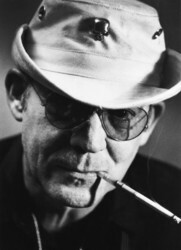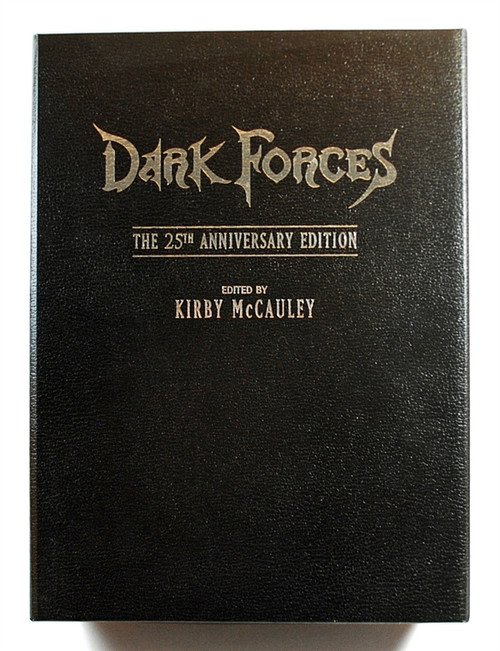Personally signed by Hunter S. Thompson, the American journalist and author, who rose to prominence with the publication of Hell's Angels (1967).
Neville Publishing Inc, Santa Barbara, CA, 1991. Hunter S. Thompson "Screwjack" Signed Limited Edition. Signed by the author directly onto the limitation page of the book with his FULL signature which is very unusual for Hunter Thompson. Number 157 of only 300 produced. Hardcover book with no dust-jacket as issued.
Very Fine without any flaws. Clean and square in gold embossed red cloth covered boards with Mohawk Superfine paper.
Book Dimensions (est): 9" x 6" x 3/8"
Screwjack
A rare collection of wild and outlandish short stories—long thought to be lost—by literary legend Hunter S. Thompson.
Hunter S. Thompson’s notorious triptych Screwjack is as salacious, unsettling, and brutally lyrical as it has been rumored to be since its private printing in 1991.
“We live in a jungle of pending disasters,” Thompson warns in the opening piece “Mescalito,” a fictionalized chronicle of his first mescaline experience and what it sparked in him while he was alone in an Los Angeles hotel room in February 1969—including a bout of paranoia that would have made most people just scream no, once and for all. But for Thompson, along with the downside came a burst of creativity too powerful to ignore. The result is a poetic, perceptive, and wildly funny stream-of-consciousness take on 1969 America as only Hunter S. Thompson could see it. Screwjack just gets weirder with its second offering, “Death of a Poet,” which describes a trailer park confrontation with a deservingly doomed friend. The heart of the collection lies in its final, title piece, an unnaturally poignant love story ostensibly written by Thompson’s alias Raoul Duke from Fear and Loathing in Las Vegas. What makes the romantic tale “Screwjack” so touching, for all its strangeness, is the aching melancholy in its depiction of the modern man’s burden.
Screwjack shows how brilliant a prose stylist Thompson really is, amid all the hilarity. As he puts it in his introduction, the three stories here “build like Bolero to a faster and wilder climax that will drag the reader relentlessly up a hill, and then drop him off a cliff...That is the desired effect.”
Hunter S. Thompson's legions of fans have waited a decade for this book.
The heart of the collection lies in its final, title piece, an unnaturally poignant love story. What makes the romantic tale "Screwjack" so touching, for all its queerness, is the aching melancholy in its depiction of the modern man's burden: that "we are doomed. Mama has gone off to Real Estate School
...and after that maybe even to Law School. We will never see her again."
Ostensibly written by Raoul Duke, "Screwjack" begins with an editor's note explaining of Thompson's alter ego that "the first few lines contain no warning of the madness and fear and lust that came more and more to plague him and dominate his life...." "I am guilty, Lord," Thompson writes, "but I am also a lover -- and I am one of your best people, as you know; and yea tho I have walked in many strange shadows and acted crazy from time to time and even drooled on many High Priests, I have not been an embarrassment to you...."
Nor has Hunter S. Thompson been to American literature. Quite the contrary: What the legendary Gonzo journalist proves with Screwjack is just how brilliant a prose stylist he really is, amid all the hilarity. As Thompson puts it in his introduction, the three stories here "build like Bolero to a faster & wilder climax that will drag the reader relentlessly up a hill, & then drop him off a cliff....That is the Desired Effect".
Hunter S. Thompson
Hunter S. Thompson was born and raised in Louisville, Kentucky. His books include Hell’s Angels, Fear and Loathing at Rolling Stone, Fear and Loathing on the Campaign Trail ‘72, The Rum Diary, and Better than Sex.
Hunter Stockton Thompson (July 18, 1937 – February 20, 2005) was an American journalist and author. He rose to prominence with the publication of Hell's Angels (1967), a book for which he spent a year living with the Hells Angels motorcycle club to write a first-hand account of their lives and experiences. In 1970, he wrote an unconventional article titled "The Kentucky Derby Is Decadent and Depraved" for Scanlan's Monthly, which further raised his profile as a countercultural figure. It also set him on the path to establishing his own subgenre of New Journalism that he called "Gonzo", a journalistic style in which the writer becomes a central figure and participant in the events of the narrative.
Thompson remains best known for Fear and Loathing in Las Vegas (1972), a book first serialized in Rolling Stone in which he grapples with the implications of what he considered the failure of the 1960s counterculture movement. It was adapted for film twice: loosely in 1980 in Where the Buffalo Roam and explicitly in 1998 in Fear and Loathing in Las Vegas.
Thompson ran unsuccessfully for sheriff of Pitkin County, Colorado in 1970 on the Freak Power ticket. He became known for his intense dislike of Richard Nixon, who he claimed represented "that dark, venal, and incurably violent side of the American character". He covered George McGovern's 1972 presidential campaign for Rolling Stone and later collected the stories in book form as Fear and Loathing: On the Campaign Trail '72 (1973).
Starting in the mid-1970s, Thompson's output declined, as he struggled with the consequences of fame and substance abuse, and failed to complete several high-profile assignments for Rolling Stone. For much of the late 1980s and early 1990s, he worked as a columnist for the San Francisco Examiner. Most of his work from 1979 to 1994 was collected in The Gonzo Papers. He continued to write sporadically for various outlets, including Rolling Stone, Playboy, Esquire, and ESPN.com until the end of his life.
Thompson was known for his lifelong use of alcohol and illegal drugs, his love of firearms, and his iconoclastic contempt for authority. He often remarked: "I hate to advocate drugs, alcohol, violence, or insanity to anyone, but they've always worked for me." Thompson died by suicide at the age of 67, following a series of health problems. Hari Kunzru wrote, "The true voice of Thompson is revealed to be that of American moralist ... one who often makes himself ugly to expose the ugliness he sees around him."

- Publisher:
- Neville Publishing
- Edition:
- Signed Limited Edition
- Binding:
- Hardcover
- Author:
- Hunter S. Thompson
- Title:
- Screwjack
![Hunter S. Thompson "Screwjack" Signed Limited Edition No. 157 of 300 [Very Fine] Hunter S. Thompson "Screwjack" Signed Limited Edition No. 157 of 300 [Very Fine]](https://cdn11.bigcommerce.com/s-eohzfjch7f/images/stencil/500x659/products/3235/21065/1280x1280__50509.1714219690.jpg?c=1)
![Hunter S. Thompson "Screwjack" Signed Limited Edition No. 157 of 300 [Very Fine] Hunter S. Thompson "Screwjack" Signed Limited Edition No. 157 of 300 [Very Fine]](https://cdn11.bigcommerce.com/s-eohzfjch7f/images/stencil/50x50/products/3235/21065/1280x1280__50509.1714219690.jpg?c=1)
![Hunter S. Thompson "Screwjack" Signed Limited Edition No. 157 of 300 [Very Fine] Hunter S. Thompson "Screwjack" Signed Limited Edition No. 157 of 300 [Very Fine]](https://cdn11.bigcommerce.com/s-eohzfjch7f/images/stencil/50x50/products/3235/21066/IMG_0501_edited__91329.1714219690.jpg?c=1)
![Hunter S. Thompson "Screwjack" Signed Limited Edition No. 157 of 300 [Very Fine] Hunter S. Thompson "Screwjack" Signed Limited Edition No. 157 of 300 [Very Fine]](https://cdn11.bigcommerce.com/s-eohzfjch7f/images/stencil/50x50/products/3235/21061/IMG_0494_edited__06143.1714219690.jpg?c=1)
![Hunter S. Thompson "Screwjack" Signed Limited Edition No. 157 of 300 [Very Fine] Hunter S. Thompson "Screwjack" Signed Limited Edition No. 157 of 300 [Very Fine]](https://cdn11.bigcommerce.com/s-eohzfjch7f/images/stencil/50x50/products/3235/21067/IMG_0502_edited__63883.1714219720.jpg?c=1)
![Hunter S. Thompson "Screwjack" Signed Limited Edition No. 157 of 300 [Very Fine] Hunter S. Thompson "Screwjack" Signed Limited Edition No. 157 of 300 [Very Fine]](https://cdn11.bigcommerce.com/s-eohzfjch7f/images/stencil/50x50/products/3235/21071/IMG_0493_edited__74641.1714219720.jpg?c=1)
![Hunter S. Thompson "Screwjack" Signed Limited Edition No. 157 of 300 [Very Fine] Hunter S. Thompson "Screwjack" Signed Limited Edition No. 157 of 300 [Very Fine]](https://cdn11.bigcommerce.com/s-eohzfjch7f/images/stencil/50x50/products/3235/21068/IMG_0498_edited__83738.1714219720.jpg?c=1)
![Hunter S. Thompson "Screwjack" Signed Limited Edition No. 157 of 300 [Very Fine] Hunter S. Thompson "Screwjack" Signed Limited Edition No. 157 of 300 [Very Fine]](https://cdn11.bigcommerce.com/s-eohzfjch7f/images/stencil/50x50/products/3235/21069/IMG_0496_edited__68938.1714219720.jpg?c=1)
![Hunter S. Thompson "Screwjack" Signed Limited Edition No. 157 of 300 [Very Fine] Hunter S. Thompson "Screwjack" Signed Limited Edition No. 157 of 300 [Very Fine]](https://cdn11.bigcommerce.com/s-eohzfjch7f/images/stencil/50x50/products/3235/21063/IMG_0499_edited__89366.1714219720.jpg?c=1)
![Hunter S. Thompson "Screwjack" Signed Limited Edition No. 157 of 300 [Very Fine] Hunter S. Thompson "Screwjack" Signed Limited Edition No. 157 of 300 [Very Fine]](https://cdn11.bigcommerce.com/s-eohzfjch7f/images/stencil/50x50/products/3235/21070/IMG_0500_edited__28904.1714219720.jpg?c=1)
![Hunter S. Thompson "Screwjack" Signed Limited Edition No. 157 of 300 [Very Fine] Hunter S. Thompson "Screwjack" Signed Limited Edition No. 157 of 300 [Very Fine]](https://cdn11.bigcommerce.com/s-eohzfjch7f/images/stencil/50x50/products/3235/21064/IMG_0497_edited__11520.1714219720.jpg?c=1)
![Hunter S. Thompson "Screwjack" Signed Limited Edition No. 157 of 300 [Very Fine] Hunter S. Thompson "Screwjack" Signed Limited Edition No. 157 of 300 [Very Fine]](https://cdn11.bigcommerce.com/s-eohzfjch7f/images/stencil/50x50/products/3235/21072/IMG_0495_edited__87254.1714219720.jpg?c=1)
![Hunter S. Thompson "Screwjack" Signed Limited Edition No. 157 of 300 [Very Fine] Hunter S. Thompson "Screwjack" Signed Limited Edition No. 157 of 300 [Very Fine]](https://cdn11.bigcommerce.com/s-eohzfjch7f/images/stencil/1280x1280/products/3235/21065/1280x1280__50509.1714219690.jpg?c=1)
![Hunter S. Thompson "Screwjack" Signed Limited Edition No. 157 of 300 [Very Fine] Hunter S. Thompson "Screwjack" Signed Limited Edition No. 157 of 300 [Very Fine]](https://cdn11.bigcommerce.com/s-eohzfjch7f/images/stencil/1280x1280/products/3235/21066/IMG_0501_edited__91329.1714219690.jpg?c=1)
![Hunter S. Thompson "Screwjack" Signed Limited Edition No. 157 of 300 [Very Fine] Hunter S. Thompson "Screwjack" Signed Limited Edition No. 157 of 300 [Very Fine]](https://cdn11.bigcommerce.com/s-eohzfjch7f/images/stencil/1280x1280/products/3235/21061/IMG_0494_edited__06143.1714219690.jpg?c=1)
![Hunter S. Thompson "Screwjack" Signed Limited Edition No. 157 of 300 [Very Fine] Hunter S. Thompson "Screwjack" Signed Limited Edition No. 157 of 300 [Very Fine]](https://cdn11.bigcommerce.com/s-eohzfjch7f/images/stencil/1280x1280/products/3235/21067/IMG_0502_edited__63883.1714219720.jpg?c=1)
![Hunter S. Thompson "Screwjack" Signed Limited Edition No. 157 of 300 [Very Fine] Hunter S. Thompson "Screwjack" Signed Limited Edition No. 157 of 300 [Very Fine]](https://cdn11.bigcommerce.com/s-eohzfjch7f/images/stencil/1280x1280/products/3235/21071/IMG_0493_edited__74641.1714219720.jpg?c=1)
![Hunter S. Thompson "Screwjack" Signed Limited Edition No. 157 of 300 [Very Fine] Hunter S. Thompson "Screwjack" Signed Limited Edition No. 157 of 300 [Very Fine]](https://cdn11.bigcommerce.com/s-eohzfjch7f/images/stencil/1280x1280/products/3235/21068/IMG_0498_edited__83738.1714219720.jpg?c=1)
![Hunter S. Thompson "Screwjack" Signed Limited Edition No. 157 of 300 [Very Fine] Hunter S. Thompson "Screwjack" Signed Limited Edition No. 157 of 300 [Very Fine]](https://cdn11.bigcommerce.com/s-eohzfjch7f/images/stencil/1280x1280/products/3235/21069/IMG_0496_edited__68938.1714219720.jpg?c=1)
![Hunter S. Thompson "Screwjack" Signed Limited Edition No. 157 of 300 [Very Fine] Hunter S. Thompson "Screwjack" Signed Limited Edition No. 157 of 300 [Very Fine]](https://cdn11.bigcommerce.com/s-eohzfjch7f/images/stencil/1280x1280/products/3235/21063/IMG_0499_edited__89366.1714219720.jpg?c=1)
![Hunter S. Thompson "Screwjack" Signed Limited Edition No. 157 of 300 [Very Fine] Hunter S. Thompson "Screwjack" Signed Limited Edition No. 157 of 300 [Very Fine]](https://cdn11.bigcommerce.com/s-eohzfjch7f/images/stencil/1280x1280/products/3235/21070/IMG_0500_edited__28904.1714219720.jpg?c=1)
![Hunter S. Thompson "Screwjack" Signed Limited Edition No. 157 of 300 [Very Fine] Hunter S. Thompson "Screwjack" Signed Limited Edition No. 157 of 300 [Very Fine]](https://cdn11.bigcommerce.com/s-eohzfjch7f/images/stencil/1280x1280/products/3235/21064/IMG_0497_edited__11520.1714219720.jpg?c=1)
![Hunter S. Thompson "Screwjack" Signed Limited Edition No. 157 of 300 [Very Fine] Hunter S. Thompson "Screwjack" Signed Limited Edition No. 157 of 300 [Very Fine]](https://cdn11.bigcommerce.com/s-eohzfjch7f/images/stencil/1280x1280/products/3235/21072/IMG_0495_edited__87254.1714219720.jpg?c=1)
![Joe Hill "Gunpowder" Signed Limited Edition No. 110 of 300, First Edition [Very Fine] Joe Hill "Gunpowder" Signed Limited Edition No. 110 of 300, First Edition [Very Fine]](https://cdn11.bigcommerce.com/s-eohzfjch7f/images/stencil/500x659/products/3107/16730/1280x1280__28984.1683297293.jpg?c=1)
![Dean Koontz "The Moonlit Mind: A Tale of Suspense" Signed Limited Edition No. 77 of 300 [Very Fine] Dean Koontz "The Moonlit Mind: A Tale of Suspense" Signed Limited Edition No. 77 of 300 [Very Fine]](https://cdn11.bigcommerce.com/s-eohzfjch7f/images/stencil/500x659/products/3314/24005/1280x1280__97169.1737893520.jpg?c=1)

![“The Red Brain” Slipcased Signed Limited Edition No. 198 of 250 [Very Fine] “The Red Brain” Slipcased Signed Limited Edition No. 198 of 250 [Very Fine]](https://cdn11.bigcommerce.com/s-eohzfjch7f/images/stencil/500x659/products/3279/22589/1280x1280__20100.1726147397.jpg?c=1)